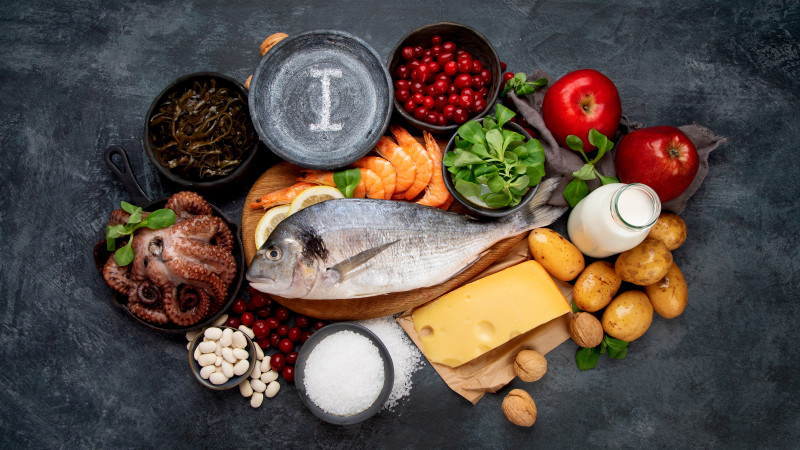Today, many people are cutting back on salt to reduce their sodium intake. While that’s a good move for heart health, it has also led to an unintended side effect — lower iodine levels. For decades, iodized salt has been one of the main sources of iodine in the American diet. As more people shift to sea salts, Himalayan salts, or low-sodium alternatives, iodine deficiency is making a quiet comeback.
But why does iodine matter so much, and how can you make sure you’re getting enough? Let’s explore how this essential mineral supports thyroid health, energy, and overall wellness, along with the best natural sources to include in your diet or supplement routine.
The Essential Role of Iodine in the Body
Iodine is a trace mineral that your body needs in small but critical amounts. Its main job is to support the thyroid gland, a small butterfly-shaped organ in your neck that regulates metabolism, energy production, and hormone balance. The thyroid uses iodine to make two key hormones: thyroxine (T4) and triiodothyronine (T3). Without enough iodine, your thyroid can’t produce these hormones properly, which can lead to symptoms of hypothyroidism such as:
-
Persistent fatigue or sluggishness
-
Weight gain or difficulty losing weight
-
Feeling cold even in warm environments
-
Dry skin and brittle hair
-
Poor concentration or brain fog
Because thyroid hormones influence every cell in your body, iodine deficiency can have far-reaching effects — not just on metabolism but also on mood, fertility, and cognitive function.
Why Iodine Deficiency Is on the Rise
For much of the 20th century, adding iodine to table salt nearly eliminated deficiency in the U.S. However, in recent years, the trend toward unrefined salts, plant-based diets, and processed foods has changed that. Unrefined and gourmet salts are often not iodized, and processed foods — which make up a large portion of modern diets — typically use non-iodized salt as well.
Certain groups are at higher risk for low iodine intake, including:
-
People who avoid dairy, seafood, or eggs
-
Vegans and vegetarians
-
Pregnant and breastfeeding women (who have higher iodine requirements)
-
Those who consume very little or no iodized salt
Additionally, some compounds found in foods like soy, cabbage, and broccoli (called goitrogens) can interfere with iodine absorption when consumed in very large amounts, making it even more important to get enough iodine through food or supplements.
Iodine and Thyroid Health
Your thyroid gland acts as your body’s energy control center, and iodine is its most important fuel source. When iodine levels drop too low, the thyroid must work harder to produce hormones, which can lead to enlargement of the gland — a condition known as goiter. Even mild iodine deficiency can slow down metabolism and impact energy, concentration, and mood.
For people already managing thyroid concerns, maintaining adequate iodine intake is essential but should be done carefully. Too much iodine can also overstimulate the thyroid, particularly in individuals with autoimmune thyroid disorders such as Hashimoto’s disease. That’s why balance is key — and why supplementing under professional guidance is best.
How Iodine Supports Energy and Metabolism
Since thyroid hormones control how efficiently your body uses energy, getting enough iodine directly influences fatigue and metabolism. When thyroid function slows down due to low iodine, so does your ability to convert calories into usable energy. This can leave you feeling tired, sluggish, and more prone to weight gain even without major changes in diet or activity levels.
Ensuring proper iodine intake can help your thyroid maintain healthy hormone levels, leading to improved energy, clearer thinking, and better overall vitality.
Best Food Sources of Iodine
You don’t need a lot of iodine — just enough to keep your thyroid functioning smoothly. The recommended daily intake (RDI) for most adults is about 150 micrograms per day, though needs increase to 220 mcg during pregnancy and 290 mcg while breastfeeding.
Here are some of the best dietary sources:
-
Seafood such as cod, shrimp, and tuna
-
Seaweed, including kelp, nori, and wakame (one of the richest sources of iodine)
-
Dairy products like milk, cheese, and yogurt
-
Eggs, especially the yolks
-
Iodized salt — just ¼ teaspoon can provide your full daily requirement
If you follow a plant-based diet or rarely eat seafood, you may benefit from adding a supplement to maintain healthy levels.
When to Consider an Iodine Supplement
Even a balanced diet can sometimes fall short, especially if you don’t use iodized salt or eat seafood regularly. An iodine supplement can help ensure your thyroid gets the consistent support it needs to function optimally.
Supplements that combine iodine with other thyroid-supportive nutrients, such as selenium and zinc, can be especially effective since these minerals work together to produce and activate thyroid hormones. Look for a high-quality, pure iodine formula or a multivitamin that includes it in the right dosage.
Try: DC Labs Atlantic Kelp Iodine 150Mcg – Provides an ideal daily dose of iodine to support healthy thyroid hormone production, energy metabolism, and cognitive function.
Supporting Thyroid and Energy Health Naturally
Your thyroid health influences how you feel every single day — from your energy levels to your metabolism and even your mood. While cutting back on salt may be smart for your heart, it’s important to ensure you’re not cutting back on iodine at the same time.
By focusing on whole foods like seafood, dairy, and seaweed and supplementing when needed, you can keep your iodine levels in balance and your thyroid functioning at its best. Supporting this small but mighty gland means supporting your body’s entire energy system — and that’s something worth paying attention to at every age

